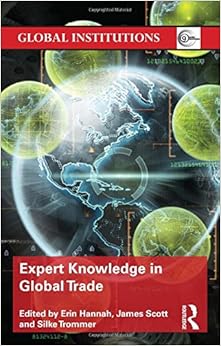Expert Knowledge in Global Trade

The first in a new series, this post accompanies the edited volume Expert Knowledge in Global Trade (Abingdon and New York: Routledge, 2015). Co-editors Erin Hannah, James Scott, and Silke Trommer invite world-class scholars to explore, assess, and challenge the origins, power and effects of expert knowledge in the global trade regime.
The year 2015 marked the 20th anniversary of the World Trade Organization (WTO) and perhaps fittingly it may prove to be a watershed moment. The 2015 WTO Ministerial Conference in Nairobi finally abandoned the tortured Doha Development Agenda and inaugurated an era of plurilateralism within the WTO modelled in the minds of many on the Tokyo Round results. Meanwhile a handful of powerful economies rewrite the trade book through megaregional trade deals outside of the multilateral system. These shifts in trade governance have important implications, particularly for developing countries.
These shifts in trade governance have important implications, particularly for developing countries.
For all the critique of the GATT/WTO system as biased against developing country interests, multilateralism has always enabled developing countries to negotiate at least procedurally on par with stronger, more advanced and better equipped WTO members, and it allowed weaker states to pool resources and operate as a bloc.
Coalescing in this way, developing countries also learned to navigate the bodies of expertise needed to engage with the global trade system.
Expert knowledge and the experts that produce and disseminate it are increasingly important elements of how the trade system, and global governance more broadly, is constituted. Well-placed professionals are able to influence policy outcomes through leveraging the privileged bodies of knowledge they hold. Such individuals are gaining importance with the advancement of globalisation, ever-greater transnational linkages and the increasing complexity of global problems.
This blog series casts greater light on the area of expert knowledge in the trade system and beyond. In so doing, it seeks to reveal the inherently political nature of expert knowledge, the various ways in which expert knowledge constrains political agency, disciplines policymaking, and limits the potential for global trade to work for sustainable development. Demystifying expert knowledge is important if we are to generate the type of global governance that gives voice to the least able, redresses injustices and power asymmetries, and produces welfare gains for all.
The blog series challenges assumptions about what constitutes legitimate knowledge in global trade and asks whether the changing standards of such knowledge are affected by shifts in global economic power. It draws from the insights of the contributors to the recent book Expert Knowledge in Global Trade, but also includes other leading scholars and practitioners working in this field.
The contributions collectively engage with the following overarching research questions:
- Who is considered to be a trade expert and how does one become a knowledge producer in global trade?
- How do experts acquire, disseminate and legitimate knowledge?
- What agendas are advanced by expert knowledge?
- How does the discourse generated within trade expertise serve to close off alternative institutional pathways and modes of thinking?
- What potential exists for the emergence of more emancipatory global trade policies from contemporary developments in the field of trade expertise?
Subsequent posts take this as their starting point to examine numerous issues.
In recent years, theoretical assumptions that ideas, perceptions, values, world views and belief systems all matter in the construction of economic interest have begun to move more centre stage in trade governance research. Whether in the disciplines of economics, politics, or law, the implications for the field are wide-reaching. With this blog series, we would like to encourage scholars and practitioners to contribute to the evolving debate. We invite analyses that unpack or reconstruct the taken-for-granted elements of knowledge, particularly in, but not limited to, economics and law, explorations of the conditions under which conventional wisdom can be challenged, and evaluations of the transformative potential of state and non-state agents of global trade governance.
Numerous theoretical perspectives give insights into the arena of expert knowledge, whether it be constructivist attention to epistemes and epistemic communities, Gramscian concerns with intellectuals and competing ideologies, or gender-based or post-structuralist analyses of the privileging of particular forms of knowledge and the role of discourses in legitimating certain orders. The main tension in the scholarly debate over the role of expert knowledge in global governance centres on the relationship between knowledge and power and the conditions under which the shackles of received wisdom might be loosened, and by whom.
Rather than seeking to mediate this debate or to favour one such approach over others, this blog series is open to all theoretical and analytical approaches that give greater insight into how expert knowledge shapes the global trading system as we know it, including avenues for reform. We deem such research agendas essential, if we want an international trade regime that takes seriously issues of inequality, welfare and poverty and meaningfully addresses sustainable development concerns.
Given the often-invoked need for “thinking outside the box” in trade politics, such reflection may be exactly what is required to identify the social forces that can help unleash the potential of global trade to work for sustainable futures.
Erin Hannah is Associate Professor of Political Science at King’s University College at the University of Western Ontario, Canada. She is an international political economist specializing in global governance, trade, sustainable development, poverty and inequality, global civil society, and European Union trade politics. She is the author of NGOs and Global Trade: Non-State Voices in EU Trade Policymaking (Abingdon and New York: Routledge, 2016) and co-editor (with James Scott and Silke Trommer) of Expert Knowledge in Global Trade (Abingdon and New York: Routledge, 2015).
James Scott is lecturer in International Politics in the Department of Political Economy at King’s College London. He works primarily on trade governance, particularly with regard to developing countries in the World Trade Organization, and also on rising powers in various areas of global governance. Dr. Scott has published extensively on these subjects and his latest book is the co-edited Trade, Poverty, Development: Getting beyond the WTO’s Doha Deadlock, with Rorden Wilkinson (Abingdon and New York: Routledge, 2013).
Silke Trommer is University Lecturer at the Department of Political and Economic Studies at the University of Helsinki. She is author of Transformations in Trade Politics: Participatory Trade Politics in West Africa (Abingdon and New York: Routledge, 2014). Her doctoral dissertation on which the book is based won the 2013 International Political Economy Best Dissertation Award (International Studies Association), 2012-2014 Best International Relations Dissertation Produced in a Finnish University (Finnish Foundation for Foreign Policy Research) and the 2014 Dissertation Prize in Supranational Political Economy (University of Pavia). Her main research interests are global trade governance, trade and development, and trade and civil society.
Photo credit: takomabibelot via Foter.com / CC BY


